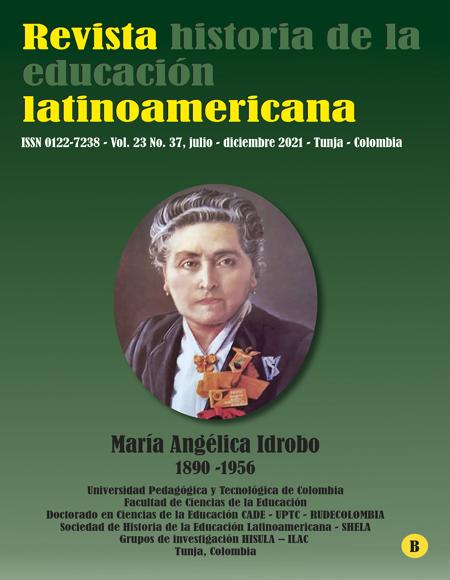Social representations of primary school children’s families about Aprende en Casa strategy during the Pandemic

Abstract
Objective: The objective of this research exercise is to understand the social representations (SR) of families in the city of Bogota about the Learn at Home Strategy.
Originality: This research exercise seeks to contribute to the field of Educational Sciences and pedagogical practices in contexts of crisis and change, describing the relationship between psychological, social and educational processes during the "mandatory preventive isolation" as a consequence of the declaration of the pandemic by COVID-19.
Method: This research is framed in the historical-hermeneutic approach, using qualitative construction and analysis tools in four moments: 1) Research approach, 2) Construction of the information, 3) Systematization and organization of the data and 4) Analysis of the social representations.
Strategies / information gathering: Autobiographical reports constructed from the everyday accounts of the researchers and participants, containing condensed, expanded, theoretical and methodological notes. The reports were analyzed by means of matrices of categories and subcategories with which the core-periphery diagram of the SRs was subsequently constructed, taking into account the frequency of appearance of texts associated with the subcategories.
Conclusions: The 7 categories and 23 subcategories constructed show the families' understanding of the purpose of the strategies designed by the educational institutions to give continuity to the processes, however, they show the difficulties experienced at home due to the confusion between time and study/leisure activities, maintaining the children's attention, parental availability, among others, which lead to conflicts, unmanaged emotions and even school dropout.
Keywords
Education, childhood, pandemic
Author Biography
Diana L. Roncancio
Tecnóloga en Gestión del Talento Humano, estudiante de 8° semestre de Psicología de la Universidad Católica de Colombia e investigadora independiente, correo electronico: eaacosta11@ucatolica.edu.co
Erika A. Acosta
Estudiante de 8° semestre de Psicología de la Universidad Católica de Colombia, correo electronico: dlroncancio87@ucatolica.edu.co
Liliana Reyes Gómez
Doctoranda en Ciencias de la Educación de la UPTC- RUDECOLOMBIA, Antropóloga de la Universidad Nacional de Colombia, Psicóloga de la Universidad Católica de Colombia. Docente investigadora en los campos de Psicología Social y Comunitaria y Educación. Investigadora del Grupo Construyendo Comunidad Educativa.
References
- Cabero, Julio “Los retos de la integración de las TICs en los procesos educativos.
- Límites y posibilidades”. Perspectiva Educacional 49, No 1 (2011): 32-61.
- https://bit.ly/33pb1Wf
- Chávez Plazas, Yuri Alicia y María Lucero Ramírez Mahecha. “Representaciones sociales
- sobre el territorio, desde los acuerdos de la Habana, en un grupo de mujeres rurales del
- municipio de Viotá, Cundinamarca”. Tabula Rasa No. 29 (2018): 295-314.
- Doi: https://doi.org/10.25058/20112742.n29.14 DOI: https://doi.org/10.25058/20112742.n29.14
- Gértrudix Barrio, Felipe y Verónica Ballesteros Ávila. “El Uso De Herramientas 2.0 Como
- Recursos Innovadores En El Aprendizaje De Niños Y Niñas En Educación Infantil.Un
- Estudio De Caso De Investigación-acción”. Revista Electrónica De Tecnología
- Educativa, No. 48 (2014). https://doi.org/10.21556/edutec.2014.48.60 DOI: https://doi.org/10.21556/edutec.2014.48.60
- Herrera-Pavo, Miguel, Griselda Amuchástegui y Jorge Balladares-Burgos. “La Educación
- Superior Ante La Pandemia”. Revista Andina de Educación. 3, No. 2 (2020): 2-4.
- https://doi.org/10.32719/26312816.2020.3.2.0 DOI: https://doi.org/10.32719/26312816.2020.3.2.0
- Ministerio de Educación Nacional, (MEN). Educación virtual o educación en línea, 2017.
- https://bit.ly/3rppqtK
- Rodríguez, Tania. “El Debate de las Representaciones Sociales”. Revista Relaciones Estudios
- de Historia y Sociedad, No. 93 (2003) 49-80. https://bit.ly/3A4H9dQ
- Rubira García, Rainer y Belén Puebla-Martínez. “Representaciones sociales y comunicación:
- apuntes teóricos para un diálogo interdisciplinar inconcluso.", Convergencia Revista
- de Ciencias Sociales. No. 76 (2018): 147-167.
- https://doi.org/10.29101/crcs.v25i76.4590 DOI: https://doi.org/10.29101/crcs.v25i76.4590
- Secretaria de Educación del Distrito, (SED). Circular No. 12 de 2020. https://bit.ly/3qwx5He
- Strauss, Anselm y Juliet Corbin, Bases de la investigación cualitativa: Técnicas y
- procedimientos para desarrollar la teoría fundamentada. Colombia: Editorial
- Universidad de Antioquia, 2012.
- Suárez, Natalia, Estrella Fernández, Rebeca Cerezo, Celestino Rodríguez, Pedro Rosário y
- José Núñez. “Tareas para casa, implicación familiar y rendimiento académico”. Aula
- Abierta 40 No.1 (2012): 73-84 https://bit.ly/33nda4U
- Valles, Miguel. Técnicas cualitativas de investigación social. 1ra edición. España. Síntesis
- Editorial. (1999). DOI: https://doi.org/10.1016/S0300-2977(99)00047-9
